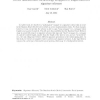Free Online Productivity Tools
i2Speak
i2Symbol
i2OCR
iTex2Img
iWeb2Print
iWeb2Shot
i2Type
iPdf2Split
iPdf2Merge
i2Bopomofo
i2Arabic
i2Style
i2Image
i2PDF
iLatex2Rtf
Sci2ools
110
click to vote
TCC
2004
Springer
2004
Springer
On the Random-Oracle Methodology as Applied to Length-Restricted Signature Schemes
In earlier work, we described a “pathological” example of a signature scheme that is secure in the Random Oracle Model, but for which no secure implementation exists. For that example, however, it was crucial that the scheme is able to sign “long messages” (i.e., messages whose length is not a-priori bounded). This left open the possibility that the Random Oracle Methodology is sound with respect to signature schemes that sign only “short” messages (i.e., messages of a-priori bounded length, smaller than the length of the keys in use), and are “memoryless” (i.e., the only thing kept between different signature generations is the initial signing-key). In this work, we extend our negative result to address such signature schemes. A key ingredient in our proof is a new type of interactive proof systems, which may be of independent interest.
Related Content
| Added | 02 Jul 2010 |
| Updated | 02 Jul 2010 |
| Type | Conference |
| Year | 2004 |
| Where | TCC |
| Authors | Ran Canetti, Oded Goldreich, Shai Halevi |
Comments (0)

